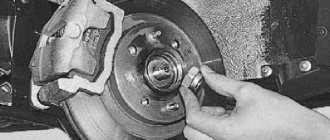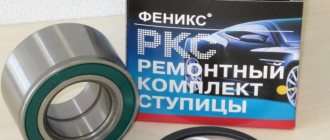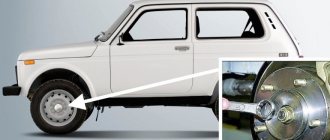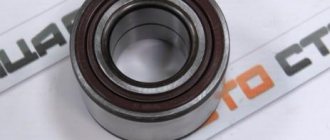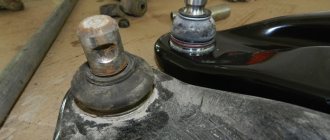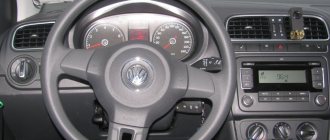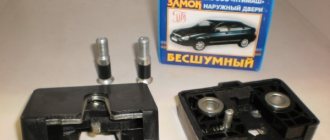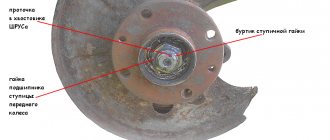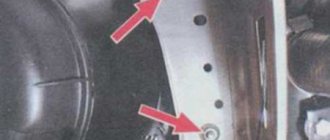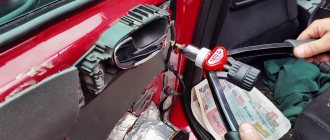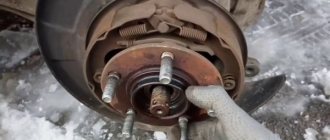The main purpose of any bearing is to support and fix the shaft. This ensures free rotation of the shaft in space. In addition, the bearing takes on the mechanical load and transfers energy to other elements. Wheel bearings are a type of rolling bearings. Without it, it is impossible to ensure that the wheel rotates smoothly around its axis without displacement and runout. These devices are used in all trucks and cars, including the Lada Largus. In this case, the front wheel hub element has a number of differences from the wheel bearing on the rear axle of the car.
Purpose of the wheel bearing
The front wheel bearing is used to allow the Lada Largus wheel to rotate freely. Manufacturers use high-strength metal as the basis for this product. This allows the hinge to withstand increased loads. Over time, this part experiences natural wear and tear, resulting in the need for replacement. Also, improper operation can contribute to the damage of the hinge, then the bearing needs to be replaced.
Vigilance should be exercised in terms of timely diagnosis of the condition of this important component of the chassis, which has a significant impact on ensuring the overall safety of people present in the vehicle. To avoid emergency situations, timely replacement of the bearing will be a truly effective measure. It is important to carry out this repair measure when the first signs of damage appear.
Shown here is a view of the front wheel bearing of the Lada Largus chassis.
Front wheel bearing Lada Largus (without ABS), prices and options
| vendor code | Name | Price |
| 6001547696 7701205779 | Front wheel bearing Lada Largus Renault (Original) (bearing + nut, without circlip) | 2096 RUR BUY INFO |
| GB.12807.S10 | Front wheel bearing Lada Largus SNR (France) | 1467 RUR BUY INFO |
| R155.62 R155.16 GB.40706.R00 | Front wheel bearing Lada Largus SNR (France) kit | 1679 RUR BUY INFO |
| BK26001 | Front wheel bearing Lada Largus Breckner (Germany) | 830 rub. BUY INFO |
| 700310 | Front wheel bearing Lada Largus Optimal (Germany) | 940 rubles specify |
| 30451 | Front wheel bearing Lada Largus Asam (Romania) | 849 RUR BUY INFO |
| VKBA3596 | Front wheel bearing Lada Largus SKF (France) | 1450 rubles specify |
| BAH0012AA | Front wheel bearing Lada Largus SKF (Sweden) | 1,000 rubles specify |
| 5516 | Front wheel bearing Lada Largus Ruville (Germany) | RUB 1,300 specify |
Causes of malfunction
The front wheel bearing is a fairly strong part in its structure, and in order to prematurely fail it requires the application of truly significant efforts. With adequate operation, this suspension component exhibits enviable survivability, without annoying the owner with hints of its malfunction. Only natural wear and tear over a long run can affect the condition of this component.
If we touch on the reasons for the failure of the bearing we are considering, we can highlight several aspects:
- Increased mileage. Bearing failure in a Lada Largus can make itself felt after a mileage of 60 to 110 thousand km. This parameter is individual for each model. It is also directly influenced by operating conditions. The occurrence of a breakdown will be indicated by a specific crunching sound coming from the front wheel area. Almost every driver knows about this sound accompaniment of a malfunction.
- Loss of tightness. The separator part of the bearing is covered with plastic casings. They allow the lubricant to be retained and reduce the amount of friction that occurs when the internal race of the product rotates together with the hub. Over time, these protective elements become unusable, after which dirt penetrates into the working area, washing away the lubricant. Soon a hum appears, which hints to the owner that the node needs to be diagnosed.
- Extreme riding. Broken roads are not the ally of wheel bearings. Regular driving of the Lada Largus over potholes mercilessly damages these seemingly reliable suspension elements.
- Incorrect installation. An incorrectly replaced bearing will not perform its functions and will soon require another replacement.
Second step
When the steering knuckle is removed, it needs to be inserted into a vice. We strike the end of the hub with a hammer. We need to press it out. The inner ring, located closer to the hub, does not need to be removed. Use a screwdriver to remove the protective washer. Afterwards we will need a vice again.
We clamp the hub flange into them, insert a chisel between the end of the inner ring and the hub shoulder. We hit the chisel with a hammer and try to move the ring. After which we will need a puller; just insert its grips into the gap and then compress the hub. Then the bearing is knocked out with hammer blows.
As for the work from a master, the new bearing itself will cost you around 1 - 1.5 thousand rubles, plus the work itself will cost the same amount.
How to diagnose?
In practice, there are a number of signs that make it possible to indicate with sufficient confidence that a bearing is failing. Among them:
- A crunching sound that can be clearly heard in the cabin.
- A characteristic vibration on the steering wheel, which increases with speed.
- The car pulls to the sides, reminiscent of a lack of proper wheel alignment.
Professional advice
The bearing should be replaced as soon as the first symptoms of a malfunction occur. When a breakdown is identified, you need to head to the repair site at a speed not exceeding 40 km per hour.
Main functions
For free and correct rotation of wheels on the Lada Largus, special hub bearings are used. The devices are made of high-strength metals and have a cast form. This is necessary because during operation they take on large mechanical loads. As you drive, this element, one way or another, begins to wear out naturally. This inevitably leads to the fact that the part needs to be changed. The need for replacement can be accelerated by improper operation of the vehicle or unqualified repairs.
The bearing is located on the axis of the wheel hub. Every car owner must be vigilant and be able to recognize malfunctions of this mechanism, since the safety of driving the car and all the people in it depends on it. If this element is destroyed, the wheel may jam and the car will become uncontrollable. And at high speed this will likely provoke an emergency, so you should not neglect replacement. With all this, wheel bearings are very strong, wear-resistant and durable parts (given high-quality products) that can withstand heavy loads.
Double-row conical roller-type devices are installed on the front axle. The use of more complex units is due to the use of front-wheel drive, where during braking, acceleration, etc., several forces act on the bearings simultaneously. At the rear, single-row roller hubs are installed, since the load on the rear axle is much less.
Preparation
The replacement operation will require the presence of tools, namely:
- wrenches (socket and socket);
- hammer;
- heads with an extended knob for unscrewing the hub fasteners;
- retaining ring removers;
- mandrels
Before work, the LADA Largus car must be hung or positioned over the hole, in the latter case, having previously raised the corresponding side and secured it from arbitrary rolling. Let's find out whether the car is with or without ABS.
Lada Largus fuel consumption
Rear additional lights Largus
Rear wheel bearing part numbers
Since Renault Logan can be equipped with ABS, there are two types of rear wheel bearings. One includes ABS function, and the second does not. Therefore, the parts are different and it is worth knowing if the car has ABS and buying a spare part accordingly.
ABS bearing article number
First, let's look at what kind of rear wheel bearings exist for Renault Logan with ABS.
The original article number for the Renault Logan rear wheel bearing with ABS looks like this - 77 01 207 677. The average cost in the Russian Federation is 2850 rubles.
There are quite a lot of analogues and they are all certified, but not all are recommended for installation on a car. Therefore, in the table we consider the main ones that can be installed on Renault Logan:
| Manufacturer's name | vendor code | Average cost in the Russian Federation in rubles |
| Starline | LO 03637 | 1150 |
| Denckermann | W413272 | 1250 |
| Bta | H1R023BTA | 1350 |
| Master-sport | 3637-SET-MS | 1600 |
| Coram | CR076 | 1700 |
| Kraft Automotive | 4105185 | 1750 |
| Asam | 30925 | 1800 |
| Pilenga | PW-P 3637 | 2000 |
| Koyo | KOYO-8088 | 2100 |
| Torque | PLP-101 | 2200 |
| Mapco | 26126 | 2300 |
| Febest | DAC37720037M-KIT | 2400 |
| Meyle | 16-14 650 0011 | 2400 |
| Nipparts | N4701045 | 2400 |
| Optimal | 701 977 | 2400 |
| ABS | 200425 | 2500 |
| Automotor France | ABR5575 | 3000 |
| SNR | R155.75 | 3200 |
| Febi | 24315 | 3900 |
| Ruville | 5575 | 3900 |
| SWAG | 60 92 4315 | 6000 |
SNR bearing for Renault Logan with ABS
Thus, it can be seen that an analogue of the original Renault Logan rear wheel bearing with ABS costs an average of 2,400 rubles. This is slightly cheaper than the part produced by the Renault plant.
Bearing article without ABS
Now, let's look at the article numbers of the original part, as well as its analogues without ABS:
7701205812 is the original catalog number of the rear wheel bearing for Renault Logan without ABS. The average cost in the Russian Federation is 2000 rubles.
As in the first option, there are quite a lot of analogues of the Renault Logan rear wheel bearing without ABS. Let's consider the main ones and those that are recommended for quality for installation on a car:
| Manufacturer's name | vendor code | Average cost in the Russian Federation in rubles |
| Kamoka | 5600011 | 600 |
| Dello | 30770102050812 | 700 |
| Master-sport | 3525-SET-MS | 700 |
| Starline | LO 03525 | 700 |
| Coram | CR025 | 700 |
| Bta | H21071BTA | 700 |
| Toko cars | HJ2-171MX | 750 |
| N.K. | 763908 | 780 |
| Cx | CX 597 | 800 |
| Febest | DAC25520037-KIT | 830 |
| Kraft Automotive | 4105010 | 900 |
| Profit | 2501-0869 | 900 |
| Pilenga | PW-P 3525 | 975 |
| Torque | DAC 25520037 | 975 |
| Febi | 05538 | 1000 |
| Fenox | WKB60171 | 1050 |
| Japan Cars | H21071JC | 1150 |
| Asam | 30450 | 1200 |
| Optimal | 702 312 | 1300 |
| Pilenga | PW-P 3525 | 1300 |
| ABS | 200004 | 1350 |
| Ruville | 5563 | 1500 |
As can be seen from the table, there are quite a few analogues of the rear wheel bearing for the version without ABS. At the same time, the cost is much lower than the original. The installation of these spare parts is carried out in standard seats and does not require any modification or modification.
Algorithm of actions
- We dismantle the steering knuckle. We first carry out the entire list of necessary actions, which we do not focus on here.
- Using a press, press the hub out of the steering axle. If there is no press, then we use a mandrel paired with a hammer.
- With this action, the bearing in most cases is destroyed and its inner race remains on the hub shaft. A puller will help you remove it. If it is missing, you will have to cut it off, although this is dangerous due to damage to the hub shaft.
- We remove the outer race of the product from the cavity of the fist.
- We install the new bearing and secure it with a retaining ring.
- We press in the hub. We check that it is seated correctly.
- We install the assembly assembly on the LADA Largus car.
Replaced the front hub
During maintenance, a slight play in the right hub was revealed. It doesn’t seem to be critical yet, but in two weeks the “long-haul” wakes up, and somehow I’m not used to risking myself or my family, it’s not worth it. Started searching for the bearing. The original Renault is not even cheap, about three rubles, and for a Nissan it is even more expensive. It’s interesting that during disassembly it turned out that my number was just Nissan’s! Analogues are more than two times cheaper, but the reviews on the Internet are far from unambiguous, in short, depending on your luck. But this is due to the bearing; with analogues there is a second problem: very often the ABS conflicts and generates an error. I read various forums, found how to distinguish a fake of an original SNR bearing and began searching around the city. The search led to a store of original spare parts for VAZs. The kit for Largus costs 1,730 rubles.
Moreover, this is a 100% original in a branded Renault box and under the first sticker there was a second one, with the original number.
The kit does not include a ring for the sensor, but this is even correct. The ring does not fall out during disassembly, even when cleaning. I studied the key points for replacement on the internet and went on the lift. When checking, I discovered that over the 350 km that I drove after the maintenance, the play began to progress. So, it was not in vain that he started the replacement. I will not describe the process of removing the steering knuckle; there is even more than one detailed video on YouTube. I only had one problem: the CV joint did not want to come out along the splines. Slowly filling him with VD and tapping, he pushed him out of his place. Everything else was done using a hydraulic press. I've already pushed out the hub.
There is no wear or pitting on this side of the track. But the p/n didn’t show itself in any way except that there was a backlash, there was no hum or any other noise.
On our cars, unlike Logans, there is a boot made of microporous rubber at the sensor mounting location.
It's bad, but you can see the Nissan license plate.
The sensor ring fits very tightly, I did not knock it out. Cleaned the seat thoroughly.
It is not possible to remove the inner ring without splitting and damaging the seat; it sits very tightly.
I sprinkled metal dust on the old bearing; if you want, you can count the number of magnets. We should have 48 pairs as far as I understand. I honestly didn’t count.
Pressed the new bearing into the fist. I used the original retaining ring.
Well, then I put the hub in place. There is an old bearing lying nearby.
At first glance, the work is not very difficult, but there are some pitfalls like mine with the splines. If you hurry, you can “stick” to the CV joint.
Malfunctions and their diagnosis
Car owners remember about these parts hidden from view in the hub only when problems begin and the wheel makes extraneous sounds when moving. If the issue is not natural wear and tear, then the cause may be errors during replacement or the use of parts of questionable manufacture. Such bearings are not so easy to deform or break. To achieve their destruction, you need to try hard. Typically, this element rarely gives a car enthusiast a reason to visit special service stations.
Main functions
For free and correct rotation of wheels on the Lada Largus, special hub bearings are used. The devices are made of high-strength metals and have a cast form. This is necessary because during operation they take on large mechanical loads. As you drive, this element, one way or another, begins to wear out naturally. The bearing is located on the axis of the wheel hub. Every car owner must be vigilant and be able to recognize malfunctions of this mechanism, since the safety of driving the car and all the people in it depends on it. If this element is destroyed, the wheel may jam and the car will become uncontrollable.
Double-row conical roller-type devices are installed on the front axle. The use of more complex units is due to the use of front-wheel drive, where during braking, acceleration, etc., several forces act on the bearings simultaneously. At the rear, single-row roller hubs are installed, since the load on the rear axle is much less.
With proper operation and timely maintenance, these elements can last up to 130,000 kilometers or more.
Rear wheel hub axle 430426964R for VAZ Largus
Dear customers, in order to avoid errors when sending the rear wheel hub axle (trunnion) for Lada Largus / LADA Largus, Duster, Logan, in the “Comment” line, indicate the diameter of the rear drum, with or without ABS, the model of your car, the year.
The rear suspension of the Lada Largus / LADA Largus is semi-independent with an elastic beam, spring with telescopic gas-filled double-acting shock absorbers.
Brackets for supporting the springs are welded to the beam and levers. To increase lateral stability and reduce roll angles, a stabilizer bar is installed inside the beam, the ends of which are welded to the lever amplifiers.
The stabilizer is a pipe - round at the edges and oval in the middle.
Rear suspension elements of Lada Largus / LADA Largus:
1 – wheel bearing nut; 2 – bearing; 3 – shock absorber; 4 – upper spring gasket; 5 – spring; 6 – lower spring gasket; 7 – bolt of the lower shock absorber mounting; 8 – beam; 9 – cushions, washers and nut of the upper shock absorber mounting; 10 – compression stroke buffer; 11 – cover; 12 – bolt securing the beam lever to the bracket; 13 – bracket for fastening the beam lever to the body; 14 – silent block of the beam lever; 15 – bolt nut; 16 – beam lever; 17 – rear wheel axle 430426964R
Flanges are welded to the suspension arms for attaching rear wheel axles 430426964R and brake shields
At the front, the levers are equipped with welded bushings with silent blocks pressed into them. The outer bushing of the silent block is plastic, and the inner bushing is metal. The rubber mass of the silent block, vulcanized to the bushings, is asymmetrical in cross-section. Therefore, when pressing the silent block into the lever, it must be strictly oriented.
Rear wheel bearing assembly Lada Largus / LADA Largus:
1 – axle 430426964R; 2 – brake drum; 3 – rear wheel bearing; 4 – bearing retaining ring; 5 – nut; 6 – cap.
The rear wheel bearings are double row. The role of the rear wheel hub is performed by the brake drum, in the hole of which the outer bearing ring is installed with interference.
Brake drum 432002049R with bearing, magnetic ring for the ABS system Lada Largus / LADA Largus is removed to replace it if the working surface is damaged or worn (the maximum permissible inner diameter of the drum is 229.5 mm), as well as to monitor the condition of the brake mechanisms, replace brake pads and working cylinders.
Replace brake drums on Lada Largus in pairs (left and right at the same time).
During operation (until the rear brake pads are completely worn out), adjustment of the parking brake drive is not required, since lengthening the brake spacer bar compensates for the wear of the pads.
The parking brake drive needs to be adjusted only if the parking brake cables or lever are replaced.
Other articles of the product and its analogues in catalogues: 430426964R.
Lada Largus / LADA Largus, Duster, Logan.
Any breakdown is not the end of the world, but a completely solvable problem!
How to independently replace the rear wheel hub axle on a Lada Largus family car.
With the online store Discounter AvtoAzbuka, repair costs will be minimal.
Just COMPARE and BE SURE!!!
Don’t forget to share the information you find with your friends and acquaintances, as they may also need it - just click one of the social networking buttons below
sequence of work with and without ABS
The main purpose of any bearing is to support and fix the shaft. This ensures free rotation of the shaft in space. In addition, the bearing takes on the mechanical load and transfers energy to other elements. bearings are a type of rolling bearings. Without it, it is impossible to ensure that the wheel rotates smoothly around its axis without displacement and runout. These devices are used in all trucks and cars, including the Lada Largus . In this case, the front wheel hub element has a number of differences from the wheel bearing on the rear axle of the car.
